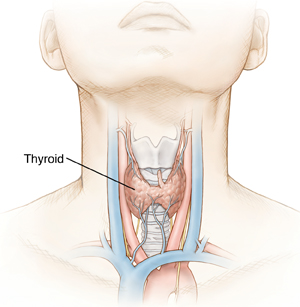Thyroid Uptake and Scan
The thyroid is a small gland in the lower front of the neck. It produces thyroid hormone. This helps control the body’s metabolism. A thyroid uptake measures how well the thyroid gland is working. A thyroid scan shows the size, shape, and location of the thyroid gland. A thyroid scan may also help identify a spot (lesion) on the thyroid gland. Thyroid uptake helps to find out if the gland is working correctly. The tests are often done together to check for problems in the thyroid gland.

Getting ready for the test
Prepare for the test as you’ve been told. In addition:
Tell your healthcare provider about all medicines you take. You may be told to stop taking some or all of them before the test. This includes:
Follow any directions you’re given for not eating or drinking before the test.
Let the technologist know
For your safety, tell the technologist if you:
-
Are pregnant or might be pregnant
-
Are breastfeeding
-
Are taking any medicines
-
Are allergic to anything, including iodine, anesthetics, or any medicines
-
Had a recent nuclear medicine scan or other tests that used iodine, including X-ray or CT tests that used contrast (dye)
-
Have any current illnesses or long-time health conditions, such as diabetes or kidney problems
The day of the test: Thyroid uptake or thyroid scan
The test is done by a nuclear medicine technologist or healthcare provider. The length of the test varies depending on the method used for each procedure and if you’re having only one or both tests done.
Before the test
-
For the thyroid uptake test. You'll be asked to swallow a capsule or drink a liquid that contains radioactive iodine. You will have to wait 24 hours before having the uptake test to give the iodine time to collect in your thyroid.
-
For the thyroid scan. You'll be asked to swallow a capsule or drink a liquid that contains radioactive iodine in most cases. But a technetium (also known as Technetium-99m) tracer can be used and injected in the vein. If the technetium tracer is used, it is put through an IV (intravenous) line into a vein in your hand or arm. You may only need to wait about 30 minutes before having the scan done.
During the test
-
For the thyroid uptake test. You’ll need to sit upright. A small device is then placed at the front of your neck. The device measures the amount of iodine that has collected in your thyroid.
-
For the thyroid scan. You’ll lie down on a narrow table. A special camera (called a gamma camera) is then positioned over your neck. Pictures of your thyroid are taken from different angles. You’ll need to stay still during this process. The camera finds the location and areas where the radioactive iodine or technetium tracer has collected in your thyroid.
After the test
-
You may need to return in 24 hours to have a second uptake, scan, or both done.
-
Unless told not to, you can return to your normal routine shortly after the test. The radioactive iodine will pass out of your body in your urine a few days after the exam. Drink plenty of water to help flush it out of your body.
When to call your healthcare provider
Call your healthcare provider right away if any of the following occur:
-
Rash or hives
-
Headache
-
Nausea or vomiting
-
Chest pain
-
Trouble breathing
Follow-up
The nuclear medicine healthcare provider will review the results of your tests and send a report to your healthcare provider. Your healthcare provider will then discuss the results with you when they are ready. This will likely be within a week after the test.
Risks and possible complications
A thyroid scan and uptake can pose certain risks if you are pregnant or breastfeeding. Talk with your healthcare provider about these risks before you have either test.
Allergic reactions can happen, but they are rare. Tell your healthcare provider about your allergies before the procedure.
This test does expose you to very low levels of radiation that is typical with other medical imaging studies. This exposure is felt to be very low. Often this risk is far outweighed by the benefits of the study.
Online Medical Reviewer:
Jessica Gotwals RN BSN MPH
Online Medical Reviewer:
Neil Grossman MD
Online Medical Reviewer:
Raymond Turley Jr PA-C
Date Last Reviewed:
12/1/2022
© 2000-2025 The StayWell Company, LLC. All rights reserved. This information is not intended as a substitute for professional medical care. Always follow your healthcare professional's instructions.